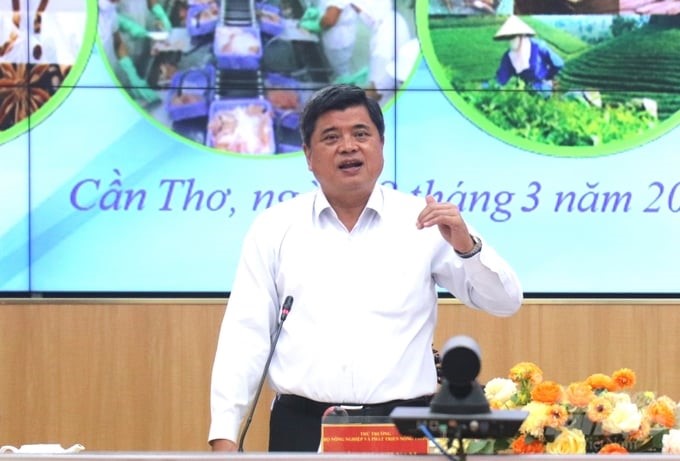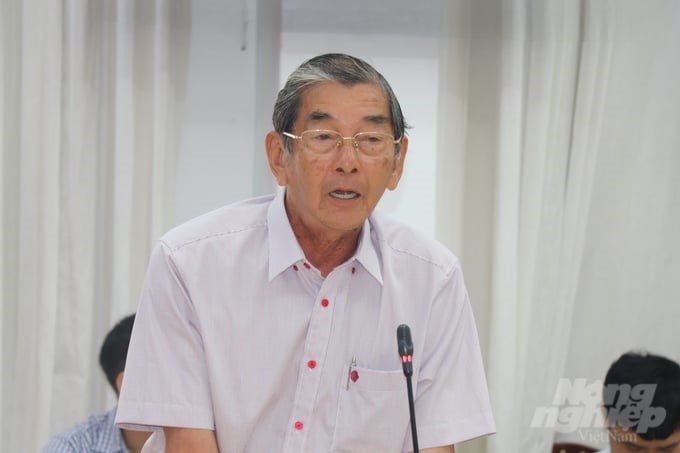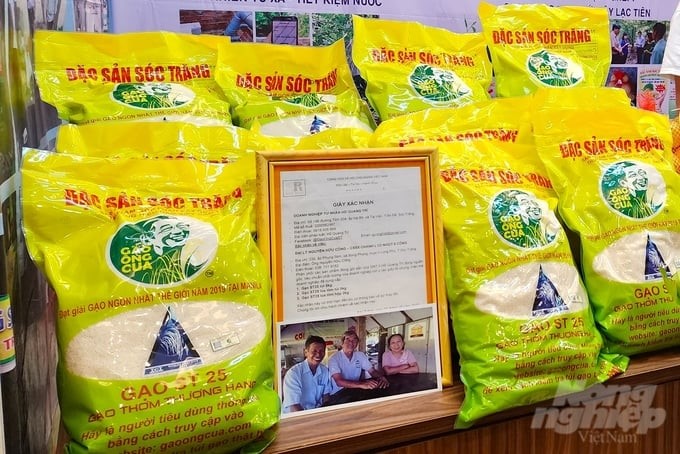May 21, 2025 | 04:42 GMT +7
May 21, 2025 | 04:42 GMT +7
Hotline: 0913.378.918
May 21, 2025 | 04:42 GMT +7
Hotline: 0913.378.918

Deputy Minister of Agriculture and Rural Development Tran Thanh Nam chaired a consultation workshop on improving legal policies for the development of Vietnamese agricultural product brands. Photo: Kim Anh.
On March 18 in Can Tho City, the Ministry of Agriculture and Rural Development organized a consultation workshop on improving legal policies for the development of Vietnamese agricultural product brands under the chairmanship of Deputy Minister of Agriculture and Rural Development Tran Thanh Nam.
Developing brands for Vietnamese agricultural products plays a big role in adding value and improving the quality as well as the competitiveness of products in the market. In recent times, the Government has issued many programs to create policies for the development of agricultural product brands, such as the Intellectual Property Strategy until 2030 and the Vietnam National Brand Program from 2020 to 2030.
The Strategy for Sustainable Agriculture and Rural Development in the 2021–2030 period, with a vision to 2050, also determines the development of three levels of brands, including the national brand for key national products, the key agricultural product brand at the provincial level, and OCOP products with small-scale agricultural products.
However, to date, very few key national agricultural products have intellectual property rights protected. On the other hand, there is no common legal corridor for the use of Vietnamese national place names to register for protection of key national agricultural products.
According to Deputy Minister Tran Thanh Nam, businesses have currently built their own agricultural product brands to promote domestic and international consumption of Vietnamese products. However, over the follow-up period, Deputy Minister Tran Thanh Nam realized that there were still many problems and needed the cooperation of businesses, experts, and industry associations to build an overall national strategy on national trademarks and brands.
In reality, product trademarks are now at many different levels, including corporate, regional, and national trademarks. Thus, determining the scope of use and resolving disputes if they occur requires a mechanism.
Particularly for the rice sector, in 2015, the Prime Minister passed Decision 706/QD-TTg approving the project on developing a Vietnamese rice brand until 2020, with a vision to 2030.

Engineer Ho Quang Cua shares the difficult journey to protect the ST25 Rice brand. Photo: Kim Anh.
By 2018, the Ministry of Agriculture and Rural Development had actively supported businesses in building and developing the Gao Vietnam/Vietnam Rice Certification Brand. This brand was granted the Certificate of Gao Vietnam/Vietnam Rice National Certification Brand by the Ministry of Science and Technology. On the Madrid system, the Gao Vietnam/ Vietnam Rice brand is protected in 21 countries. But up to now, specialized agencies are still struggling because they cannot grant trademarks due to the lack of a specific mechanism.
Engineer Ho Quang Cua, "father" of the ST25 Rice brand, has spent nearly 4 years facing continuous incidents related to intellectual property infringement in the country as well as in many other countries in the world after ST25 Rice won the World's Best Rice Award in 2019.
Six months after winning the award, in the US, there was a business that registered exclusive rights to the keyword ST25. If not blocked, this country's protection will spread to many countries around the world. This means that Vietnam's ST25 rice has very little chance of appearing on the world rice market.
After a long period of patiently working with international lawyers, in December 2023, the US officially recognized the protection of Mr. Cua's ST25 Rice trademark.
Linking this reality to the issue of developing the Vietnam Rice brand, Mr. Cua said that it is necessary to choose "quintessential" national products to build with focus. There also need to be strict and rigorous standards and norms to ensure product quality.

The Ministry of Agriculture and Rural Development will experiment with developing a national brand for rice products, moving forward to expanding to other key products. Photo: Kim Anh.
Not only the rice commodity, but agricultural and aquatic products in general also fell into a difficult position in terms of brand development.
Many delegates also agreed that national brands for agricultural products must be associated with quality standards. In terms of policy, the Ministry of Agriculture and Rural Development needs to pay attention to the system and consolidate industry associations to manage, exploit, and develop national brands.
At the same time, localities and businesses need to pay proper attention to building brands and trademarks and choosing key products to associate with the implementation of geographical indication protection.
To create a legal basis for managing national brand development, Deputy Minister Tran Thanh Nam requested the Institute of Policy and Strategy for Agriculture and Rural Development coordinate with the Department of Quality, Processing, and Market Development (Ministry of Agriculture and Rural Development) to advise and develop documents to propose to the Government a decree related to the management and development of Vietnamese agricultural product brands.
Developing a decree must follow the value chain of agricultural product brands and define the management mechanisms of agencies, localities, and branches. In the immediate future, the Ministry of Agriculture and Rural Development will experiment with building a national brand for rice products, integrating more emission-reducing rice, and expanding to other key products such as durian, shrimp, and pangasius.
Translated by Huyen Vu Thu

(VAN) Dong Thap farmers attained an average profit margin of 64% during the summer-autumn 2024 crop (first season), while An Giang and Kien Giang farmers followed with 56% and 54%, respectively.

(VAN) As a doctoral student doing research on renewable energy and electrification at Harvard University, the author shares his musings on electricity, nature, and countryside memories.

(VAN) The decree on Extended Producer Responsibility (EPR) ensures transparent management and disbursement of support funds, avoiding the creation of a “give-and-take” mechanism.

(VAN) Hue City rigorously enforces regulations regarding marine fishing and resource exploitation, with a particular emphasis on the monitoring of fishing vessels to prevent illegal, unreported, and unregulated (IUU) fishing.

(VAN) Hanoi People's Committee has issued a plan on reducing greenhouse gas emissions in the waste management sector with 2030 vision.

(VAN) Vietnam's draft amendment to Decree No. 156 proposes a mechanism for medicinal herb farming under forest canopies, linking economic development to population retention and the sustainable protection and development of forests.

(VAN) In reality, many craft village models combined with tourism in Son La have proven effective, bringing significant economic benefits to rural communities.